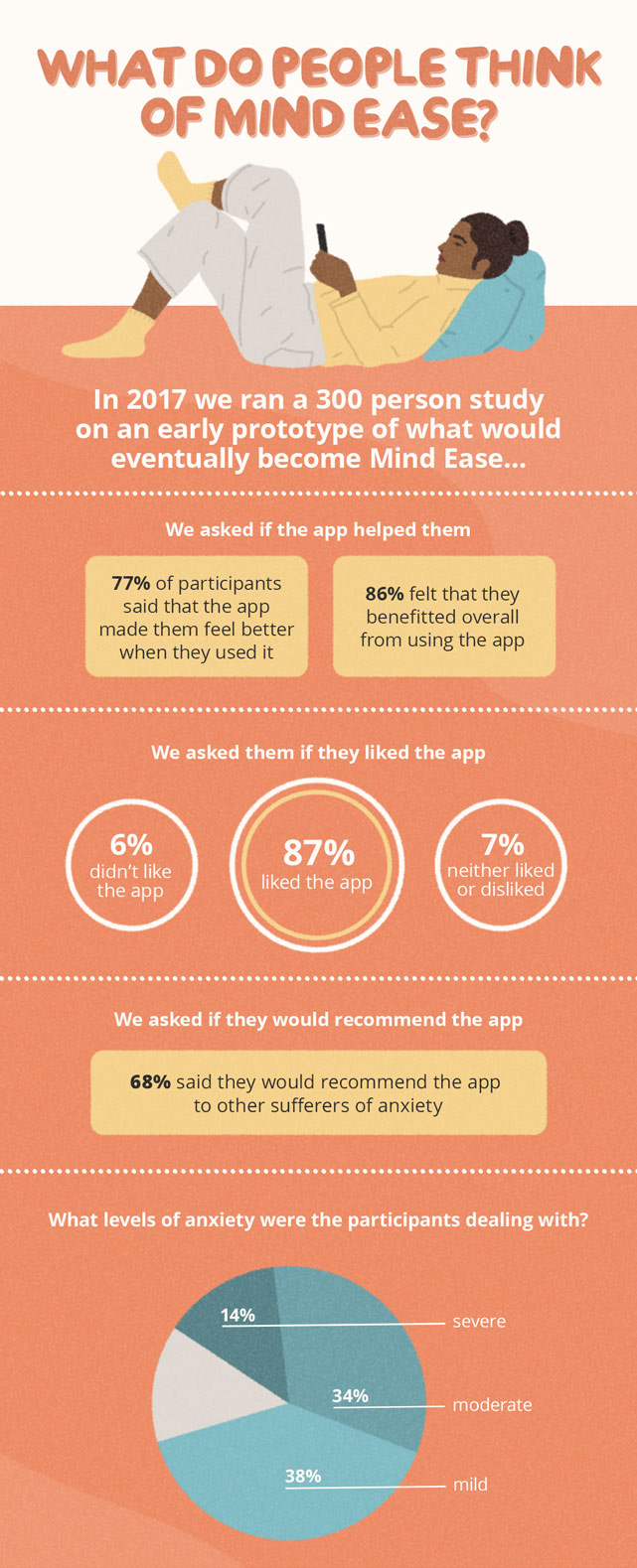The Making of Mind Ease: How User’s Opinions Shape the Development of Our App
In the earlier days of Mind Ease, we invited 300 people to trial a prototype of the app and share their feedback. In this article, we present to you some of the findings and how it helped to shape the app to where it is now.
The user experience is central to what we do at Mind Ease. We deeply care about creating an app that is not only effective for relieving symptoms of mental distress but that also makes caring for your mental health easy and enjoyable.
To achieve this, we draw on a combination of scientific evidence regarding best practices in digital mental health, real-time analysis of app usage and effectiveness, and direct feedback from our users when making decisions and creating content for the app.
We actively seek out the opinions of users in a number of ways, including paying attention to app store feedback and emails, running studies to validate our content, and inviting users to participate in interviews with our team members to share their thoughts.
In the earlier days of Mind Ease, we invited 300 people to trial a prototype of the app for 5 days and share their thoughts and feedback with us. The prototype included the core features of the app, including its “Calm Me” feature, which users can press when they are feeling anxious for a <10 min exercise to help feel calmer.
In this article, we wanted to present to you some of the findings of this trial and how it helped to shape the development of the app to where it is now.
Who trialed the app?
We found the participants for the trial on an online research recruitment platform. The participants lived in the USA and two-thirds identified as female. We tried to find people who were affected by some degree of anxiety so that we could see how much the app helped with these symptoms – about two-thirds had mild or moderate anxiety and 14% had severe anxiety.
What did people think of the app?

Overall, we were pleased to see that the feedback on the prototype was overwhelmingly positive. About three-quarters of the participants said that the app made them feel better in the moment when they used it.
The vast majority (86%) said that they felt they benefitted overall from using the app, and that they liked its design and features.
This positive feedback helped to affirm that we were on the right track, which is why many aspects of the prototype still exist in the app today. However, we weren’t just looking for validation, we were looking for ways that we could make the app even better for our users.
While 68% of participants said that they would recommend the app to other sufferers of anxiety, we wanted to understand why the remaining 32% wouldn’t recommend it, and what we could do about it.We received some really useful insights and suggestions from these users that we have since put into action to improve the app. Some of these suggestions included making the app more personalized—we added greater flexibility on setting up the app the way you like it, including personalized notifications, light/dark modes, and other options.
We also introduced an algorithm which selects the highest recommended exercise for you based on how you’re feeling and what’s worked for you in the past.
Some participants made suggestions related to the graphics, sounds, and content in the app. In response to these comments, we have replaced the images in the app from stock-images to our own illustrations by our in-house designers, added calming background sounds to the home screen, introduced a timed breathing guide, and recruited extra mental health experts to our team to write new evidence-based content.
This prototype study was a great start for us to get the app up-and-running and give us some direction, but this is always a work-in-progress! It is important to us to be responsive to our users’ needs on an ongoing basis. This is why we continuously interview users to gain more insights to grow and shape the app according to what works and what people want.
Participant testimonials about Mind Ease?
Many of the participants volunteered to give a testimonial about the app that we could share with others (this was entirely optional). Here are some of the things people said:
“I loved using this app! At first I was skeptical that I would get any benefit out of it, but it truly made a big difference for me. It gave me new and interesting techniques to help control my stress and anxiety.”
“I often found myself in situations where I’d feel tense, stressed out, or overwhelmed and couldn’t always pinpoint the reason, or even a solution. This app helped me stop and reevaluate my feelings. It really accomplishes calming the mind in a logical way!”
“As a mom of young kids, it’s sometimes hard to value my own health, especially my mental health, but Mind Ease gave me a reason to do it. The exercises were specific and easy to follow and short enough to fit into any part of my day.”
“This app was perfect after a stressful day at work. I was able to just take a few minutes to relax and clear my mind, and it really helped me to forget all the worries from the day.”
You can download the Mind Ease app here and have your say to help make this the ideal mental health companion!





